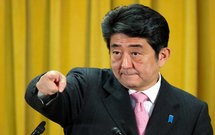 In a political system that is known for its slow pace in decision-making, Prime Minister Shinzo Abe's recent decision to reinterpret the Japanese constitution to exercise the right of collective self-defence is truly significant and could mark a turning point in Japan's security policy in the coming years.
In a political system that is known for its slow pace in decision-making, Prime Minister Shinzo Abe's recent decision to reinterpret the Japanese constitution to exercise the right of collective self-defence is truly significant and could mark a turning point in Japan's security policy in the coming years.
Whereas the supporters of Mr Abe have hailed the decision as a great victory for him, his critics have seriously questioned the procedure adopted by him to initiate such an important change in the country's security policy. They contend that he should have followed a more formal method of initiating an amendment to Article 9 of the constitution as prescribed under Article 96. But, for a regular constitutional amendment, Mr Abe would require the support of the two thirds majority of all members of both the Houses of the Japanese Diet. The ruling coalition does not enjoy that much support in the Upper House, and with more than 55 % of Japanese voters reportedly opposed to constitutional amendment, Mr. Abe was not sure of getting a favourable vote in the ensuing referendum prescribed by the constitution. It was a case of political expediency to make a decision on the collective self-defence through a reinterpretation of the constitution instead of seeking to accomplish it through a formal amendment.
The issue concerning Japan's right to collective self-defence (CSD) has a long history, going back to 1947 when the Japanese constitution was promulgated under the influence of the US Occupation authorities. Article 9 of the constitution states that Japan has renounced the use of force as an instrument to settle disputes. In pursuance of this objective, it further states, Japan will never maintain land, sea and air forces. In 1981, the Japanese government clarified that while Japan enjoys the right to collective self-defence, it cannot exercise it as it would violate the constitution. Its position ran on the following lines: While Japan has renounced the use of force, it has not abandoned its right to defend itself. As a free country, Japan possesses the right to individual and collective self-defence. But measures taken for self-defence should be limited to minimally required levels. Since collective self-defence measures would exceed those levels, they would violate the constitution.
Successive Japanese governments stood by this interpretation even though they faced relentless pressures from the US government which criticised Article 9 as an obstacle to Japan in carrying out its obligations under the security alliance. It is well-known that Japan was severely criticised during the Gulf War of 1990-91 for its checkbook diplomacy. Tokyo learnt a bitter lesson from the war that mere monetary assistance would not be sufficient to sustain its alliance with the US. The expectations of the alliance in the post-cold war period had drastically changed whereby every ally was expected to render not only financial, but also human contributions whenever military action took place.
Having learnt some lessons, Japan's response to the 9/11 terror attacks was marked by swift action. It passed anti-terrorism special laws which expanded the role of the Self-Defence Forces. It also dispatched MSDF vessels to the Indian Ocean to provide fuel supplies to the coalition forces in Afghanistan. In the case of war in Iraq, Prime Minister Mr. Junichiro Koizumi sent SDF personnel to non-combat areas, but he faced stiff resistance as public opinion within Japan was very much against President Bush's intervention in Iraq without a proper mandate from the UN.
Mr Abe came to power in December 2012 for the second time with a thumping majority in the Diet. Since then, he has been trying to put into action many of his long-cherished nationalist ideas which would make Japan a "normal country." A staunch supporter of US-Japan alliance, Mr Abe believes that the continued presence of the US in the Asia-Pacific region is essential for maintaining the prevailing strategic equilibrium. He constituted a special commission under Mr Shunji Yanai to go into the question of Japan's exercise of collective self-defence. The Yanai Commission came out with the conclusion that the Japanese security would be threatened if the ban on collective self-defence and collective security was not removed. In particular, the Commission considered the question of how to extend support for defending US naval vessels, for intercepting a ballistic missile targeting at US territory and for aiding peace-keeping forces. As the Sino-Japanese relations are getting increasingly tense over the Senkaku issue, a crisis could occur even accidentally leading to a military showdown. The US is committed to defend the Senkaku Islands under Article V of the Security Treaty. If Japan enjoys the right to CSD, it can extend considerable assistance to its ally. Mr Abe also believes that the right to CSD could help Japan deepen its involvement in regional security and lead to building security networks with countries like Australia, the Philippines, India and Vietnam.
Finally, it is necessary to note that even Mr Abe has sounded a note of caution that Japan is not going to be engulfed in wars fighting for friends abroad and that many of the present restrictions on the SDF would continue to remain in place. But critics, however, worry that the change in the constitutional position provides the choice to despatch SDF personnel and also arouses the expectation that Japan will send its forces. It is also important to note that both China and South Korea expressed their strong resentment to the Mr Abe's new policy. China, in particular, accused Japan of "deliberately fabricating a China threat so as to serve a domestic political purpose."
By Special Arrangement with : Observer Research Foundation (www.orfonline.org)